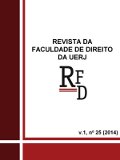DIALOGUE BETWEEN CONSTITUTION AND INTERNATIONAL LAW: INTRODUCTION TO THE CONSTITUTIONAL WEB THEORY
DOI:
https://doi.org/10.12957/rfd.2014.7202Keywords:
Constitution, International Law, Dialogue, Conflict of Law.Abstract
This article is a product of the author's initial attempt to develop a theory trying to describethe insertion of the idea of Constitution in the international Environment. The main ideais that the relationship between Constitution and International Law is, in fact, arelationship between pluralities, plurality marked between the interaction of differentnational order (Constitutions) between themselves and the common goal in obtain abroader Law, the International Law. Therefore, the latter having an obligatorycosmopolitan spirit, commonly absent in the national Laws under a Constitution. In theauthor minds, this situation can be described as being like a “spider web”, whose “spider”that spins the web is the Conflict of Law (or Private International Law). In other words,this “web spinning” is where we can find the dialogue between Constitution (NationalLaw) and International Law. Therefore, the understanding of this “web spinning” processonly can be achieve when considering not only the Law of Treatises (Public InternationalLaw), but also the rules of the Conflict of Law, when analyzing the relation betweenConstitution and International Law.Published
How to Cite
Issue
Section
License
Copyright
oArticles published in the Revista da Faculdade de Direito da UERJ (RFD/UERJ)
The copyrights of the published articles belong to the Revista da Faculdade de Direito da UERJ (RFD/UERJ). Total or partial reproduction of the articles is allowed as long as the source is cited.
oPartial reproduction from other publications
Submitted papers that contain parts of text extracted from other publications must obey the specified limits to ensure originality of the submitted work. Plagiarism in all its forms constitutes unethical behavior and is unacceptable.
It is recommended to avoid reproduction of tables and illustrations from other publications. The article that contains reproduction of one or more tables and/or illustrations from other publications will only be sent for analysis if it is accompanied by written permission from the copyright holder of the original work for the specified reproduction in the Revista da Faculdade de Direito da UERJ (RFD/UERJ). The permission must be addressed to the author of the submitted work. Under no circumstances will the Journal of the Law School of the State University of Rio de Janeiro (RFD/UERJ) and the authors of the papers published in this journal transfer the rights thus obtained.
•The refused studies will be returned to the authors, if asked.

The Revista da Faculdade de Direito is licensed under a Creative Commons Atribuição 4.0 Internacional License.
This work is licensed under a Creative Commons 4.0 Attribution-No Derivation License.
This license allows copying and redistribution of the material in any medium or format for any purpose, even commercial, provided that the original authorship is acknowledged.










